On April 14
“All persons harboring or secreting the conspirators or aiding their concealment or escape, will be treated as accomplices in the murder of the President and shall be subject to trial before a military commission, and the punishment of death.”
~Edwin Stanton
Secretary of War
April 1865
=================================

=================================
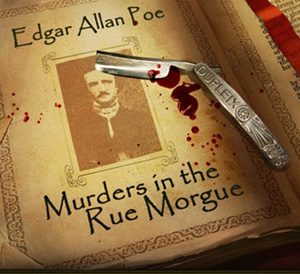
1841 – Edgar Allan Poe’s Murders in the Rue Morgue was published in Graham’s Magazine.
Often cited as the first modern detective story, the tale introduced readers to C. Auguste Dupin, a character who became the prototype for many future fictional detectives, including Arthur Conan Doyle’s Sherlock Holmes and Agatha Christie’s Hercule Poirot.
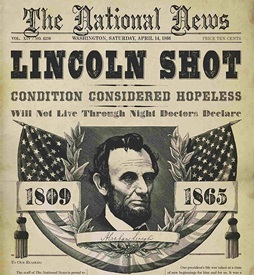
1865 – President Abraham Lincoln was shot and mortally wounded by well-known stage actor John Wilkes Booth while attending the play Our American Cousin at Ford’s Theatre in Washington, D.C.
The assassination was part of a larger conspiracy intended by Booth to revive the Confederate cause by eliminating the three most important officials of the United States government, and to kill the general who had forced General Robert E. Lee’s surrender at Appomattox just five days earlier.
After attending an April 11 speech in which Lincoln promoted voting rights for blacks, Booth decided the time had come to assassinate the President.
Learning of Lincoln’s intent to attend a play at Ford’s Theatre with General Ulysses S. Grant, Booth and his co-conspirators planned to assassinate Lincoln and Grant at the theater and to kill Vice President Andrew Johnson, who was staying at the Kirkwood House in Washington, and Secretary of State William H. Seward at his home.
At the last minute, Grant decided to go to New Jersey to visit his children instead of attending the play. Major Henry Rathbone and his fiancée Clara Harris accepted an invitation to replace Grant and his wife. Rathbone attempted to prevent Booth from fleeing the scene after shooting Lincoln, but was stabbed and seriously wounded.
Conspirator Lewis Powell was assigned the task of killing Secretary of State Seward, and George Atzerodt was given the job of killing Vice President Johnson.
Seward was seriously wounded in a vicious stabbing by Lewis Powell but survived.
George Atzerodt, Johnson’s would-be attacker, lost his nerve and never carried out his assignment.
Lincoln was carried to the Petersen House opposite the theater. He died there the following day at 7:22 a.m.
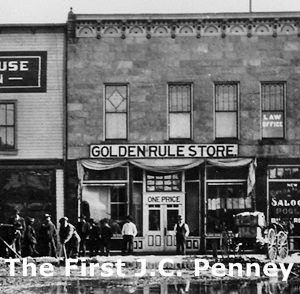
1902 – James Cash Penney opened his first store … but it wasn’t a J.C. Penney.
Golden Rule Store owners Guy Johnson and Thomas Callahan, impressed by Penney’s work ethic and salesmanship, offered him one-third partnership in a new store he would open. Penney invested $2,000 and moved to Kemmerer, Wyoming, to open a Golden Rule Store on this date.
When Callahan and Johnson dissolved their partnership in 1907 – after Penney had opened two more stores – he purchased full interest in all three stores.
In 1913, he moved the company to the Kearns Building in downtown Salt Lake City, Utah. The company was incorporated under a new name, J. C. Penney Company.
By 1929, the number of stores reached 1,400.
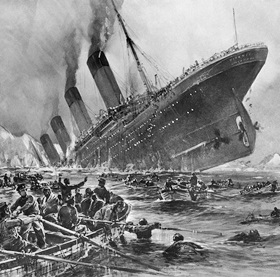
1912 – RMS Titanic collided with an iceberg during her maiden voyage from Southampton, England to New York City.
At 11:40 p.m. on the fourth day of the voyage, Titanic struck the iceberg about 375 miles south of Newfoundland. The collision caused the hull plates to buckle inwards along her starboard (right) side and opened five of her sixteen watertight compartments to the sea; she could only have survived with a maximum of four compartments flooding.
At 2:20 a.m. (April 15), she broke apart and sank with well over one thousand people still aboard.
Of the estimated 2,224 passengers and crew aboard, more than 1,500 died, making it one of modern history’s deadliest commercial marine disasters during peacetime.
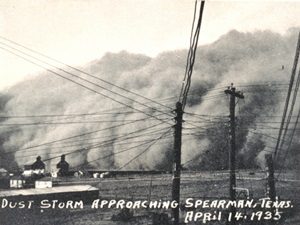
1935 – The “Black Sunday” dust storm, considered one of the worst such storms in American history, swept across the Plains states, causing immense economic and agricultural damage.
In 1934, temperatures soared, exceeding 100 degrees every day for weeks on much of the Southern Plains. It left more baked dirt to throw up in the air than there had been in previous years.
After months of brutal conditions, the skies finally cleared by the morning of April 14, 1935, and the winds died down, a rarity on the nearly treeless landscape.
Optimism abounded, with one Oklahoma minister declaring that a few good rainstorms would make the land fertile again.
Alas, it was not to be.
That morning, a cold front moving down from Canada clashed with warm air sitting over the Dakotas. In just a couple of hours, temperatures fell more than 40 degrees and the wind whipped into a frenzy, creating a dust cloud that grew to hundreds of miles wide and thousands of feet high as it headed south.
Reaching its full fury in southeastern Colorado, southwestern Kansas and the Texas and Oklahoma panhandles, it turned a sunny day totally dark.
Later estimates placed the amount of displaced topsoil at 300,000 tons, some of which flew as far away as the East Coast.
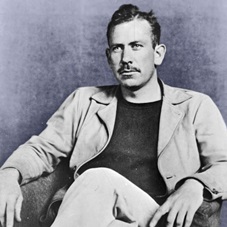
1939 – John Steinbeck’s The Grapes of Wrath was published.
Set during the Great Depression, the novel focused on a family of tenant farmers driven from their Oklahoma home by drought, economic hardship, and bank foreclosures.
The book won the Pulitzer Prize for Novels in 1940.
Timing Is Everything Factoid: The publication date was exactly four years to the day of the “Black Sunday” dust storm, which, in real life, caused many Oklahomans to migrate to California in search of work.
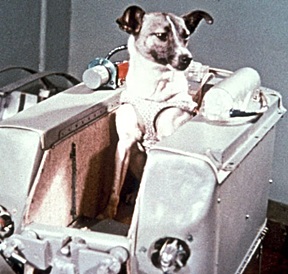
1958 – The Soviet satellite Sputnik 2 fell from orbit after a mission duration of 162 days.
It was the first spacecraft to carry a living animal – a female dog named Laika – into orbit.
It was initially claimed that Laika had survived in orbit for a week, but decades later, Russian sources admitted that Laika likely had survived only a few hours in orbit before dying from overheating.
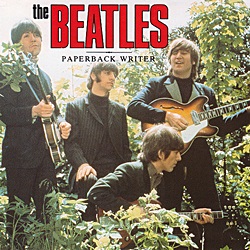
1966 – The Beatles recorded Paperback Writer.
Released as a single in May, it topped the singles charts in Britain, the United States, Ireland, West Germany, Australia, New Zealand and Norway.
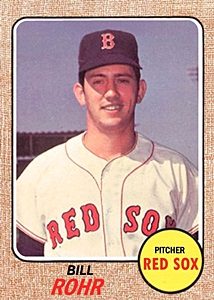
1967 – Billy Rohr had a very impressive Major League debut.
As a 21-year-old rookie, Rohr made his first start at the New York Yankees’ home opener. The slim left-hander faced future Hall of Famer Whitey Ford, and was one strike away from a no-hitter when Elston Howard hit a soft single into right-center field.
Rohr proceeded to retire the next batter for a 3–0 shutout.
Fame Is Fleeting: In his next start, Rohr beat the Yankees again, this time 6–1, but only won one more game in the majors after that. He was demoted to Triple A Louisville after the year ended, and soon after the start of the 1968 season, was sold to the Cleveland Indians.
His tenure with the Indians was short, and after 17 games for Cleveland in 1968, finishing 1-0, Rohr was again sent to the minors, where he bounced from team to team in the Eastern, Southern, International, American Association and Pacific Coast Leagues before retiring in 1972.
Yaz and “The Catch” Factoid: Boston outfielder Carl Yastrzemski did his part in keeping the no-hit bid alive. Tom Tresh led off the ninth inning for the Yankees and he scorched a ball to left field. Yaz went back and….

1967 – Face with the unenviable pressure of publicity declaring them to be “the most significant talent since the Beatles,” the Bee Gees released New York Mining Disaster 1941.
At the time, rumors circulated that the Bee Gees were the Beatles recording under a pseudonym (the Bee Gees’ name was alleged to be code for “Beatles Group”), and Atco Records distributed promos in the U.S. with a blank label and the suggestion that it was an English group whose name started with B.
The single peaked at #14 in the U.S. and # 12 in England.
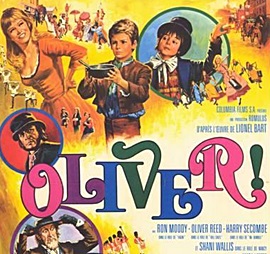
1969 – At the 41st Academy Awards, Oliver won six Oscars, including Best Picture and Best Director (Carol Reed).
The year was notable for the first – and so far, only – tie for Best Actress (or any female acting category). Katharine Hepburn (The Lion in Winter) and Barbra Streisand (Funny Girl) shared the award.
Cliff Robertson (Charly) won Best Actor, while Jack Albertson (The Subject Was Roses) and Ruth Gordon (Rosemary’s Baby) won the Best Supporting Actor and Actress awards.
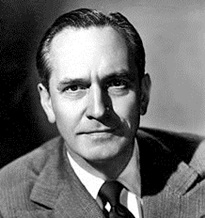
1975 – Academy Award and Tony Award winning actor Fredric March died from prostate cancer at the age of 77.
Regarded as “one of Hollywood’s most celebrated, versatile stars of the 1930s and ’40s,” he won the Academy Award for Best Actor for Dr. Jekyll and Mr. Hyde and The Best Years of Our Lives.
He was also a multiple winner of the Tony Award for Best Actor in a Play for Years Ago( and Long Day’s Journey Into Night.
His list of other credits include starring in the original A Star Is Born, Desperate Hours, Inherit The Wind, Death of A Salesman, and Seven Days In May.
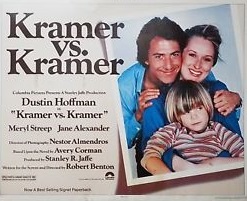
1980 – At the 52nd Academy Awards, Kramer vs Kramer won Best Picture, Best Director (Robert Benton), Best Actor (Dustin Hoffman), and Best Supporting Actress (Meryl Streep).
Sally Field won Best Actress for Norma Rae, while Melvyn Douglas (Being There) won Best Supporting Actor.
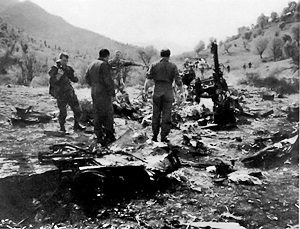
1994 – In a U.S. friendly fire incident during Operation Provide Comfort in northern Iraq, two United States Air Force F-15 Eagle fighters mistakenly shot down two United States Army helicopters, killing 26 people.
Both helicopters were fitted with external, 230-US-gallon fuel tanks on mounted beside each side door with each tank emblazoned with large American flags. In addition to the flags on the fuel tanks, each helicopter was marked with American flags on each side door, on the nose, and on the belly.
The F-15 pilots fired on and destroyed both helicopters, killing all 26 military and civilians aboard, including personnel from the United States, United Kingdom, France, Turkey, and the Kurdish community.
As a result of an investigation several USAF officers received administrative discipline but only one was tried by military court-martial, in which he was acquitted.
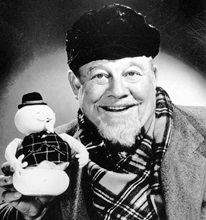
1995 – Academy Award winning actor Burl Ives died of cancer at the age of 85.
A popular film actor through the late 1940s and ’50s, Ives’s best-known film roles included parts in So Dear to My Heart and Cat on A Hot Tin Roof, as well as his role as Rufus Hannassey in The Big Country, for which he won an Academy Award for Best Supporting Actor.
As a folk and country singer, he recorded hits such as A Little Bitty Tear and Funny Way of Laughin’, but children of all ages will remember him for A Holly Jolly Christmas, which he sang in his role as Sam the Snowman, narrator of the classic 1964 Christmas television special Rudolph the Red-Nosed Reindeer.
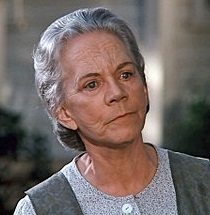
1999 – Actress Ellen Corby died at the age of 87 after several years of declining health.
She had bit parts in more than 30 films in the 1930s and 1940s, including It’s A Wonderful Life , but in 1948, her career took off when she received an Academy Award nomination and a Golden Globe for Best Supporting Actress for her stunning performance in I Remember Mama.
Her best-known role came as Grandma Esther Walton on the made-for-TV film The Homecoming: A Christmas Story, which served as the pilot for The Waltons. She continued her role as Grandma for nine seasons.
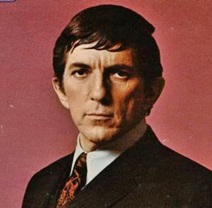
2012 – Actor Jonathan Frid, best known for playing the role of vampire Barnabas Collins on the gothic television soap opera Dark Shadows, died from complications after a fall. He was 87.
He accepted his career defining role after being told it was a short-term one that would provide him with extra cash while he prepared to move to Los Angeles to pursue a career as an acting teacher.
The “short-term” role lasted six seasons.
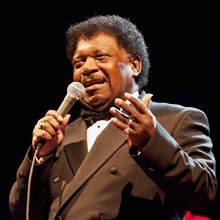
2015 – Singer Percy Sledge, best known for his #1 song When A Man Loves A Woman, died of liver cancer at the age of 73.
Sledge was inducted into the Rock & Roll Hall of Fame in 2005.
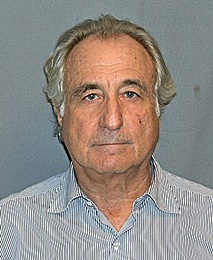
2021 – Bernard Madoff, American fraudster and financier who committed the largest fraud in U.S. history, died in prison at 82. His death was attributed to cardiovascular disease and chronic kidney disease
Madoff’s Ponzi scheme cost investors an estimated $65 billion.
Compiled by Ray Lemire ©2024 RayLemire.com / Streamingoldies.com. All Rights Reserved.
